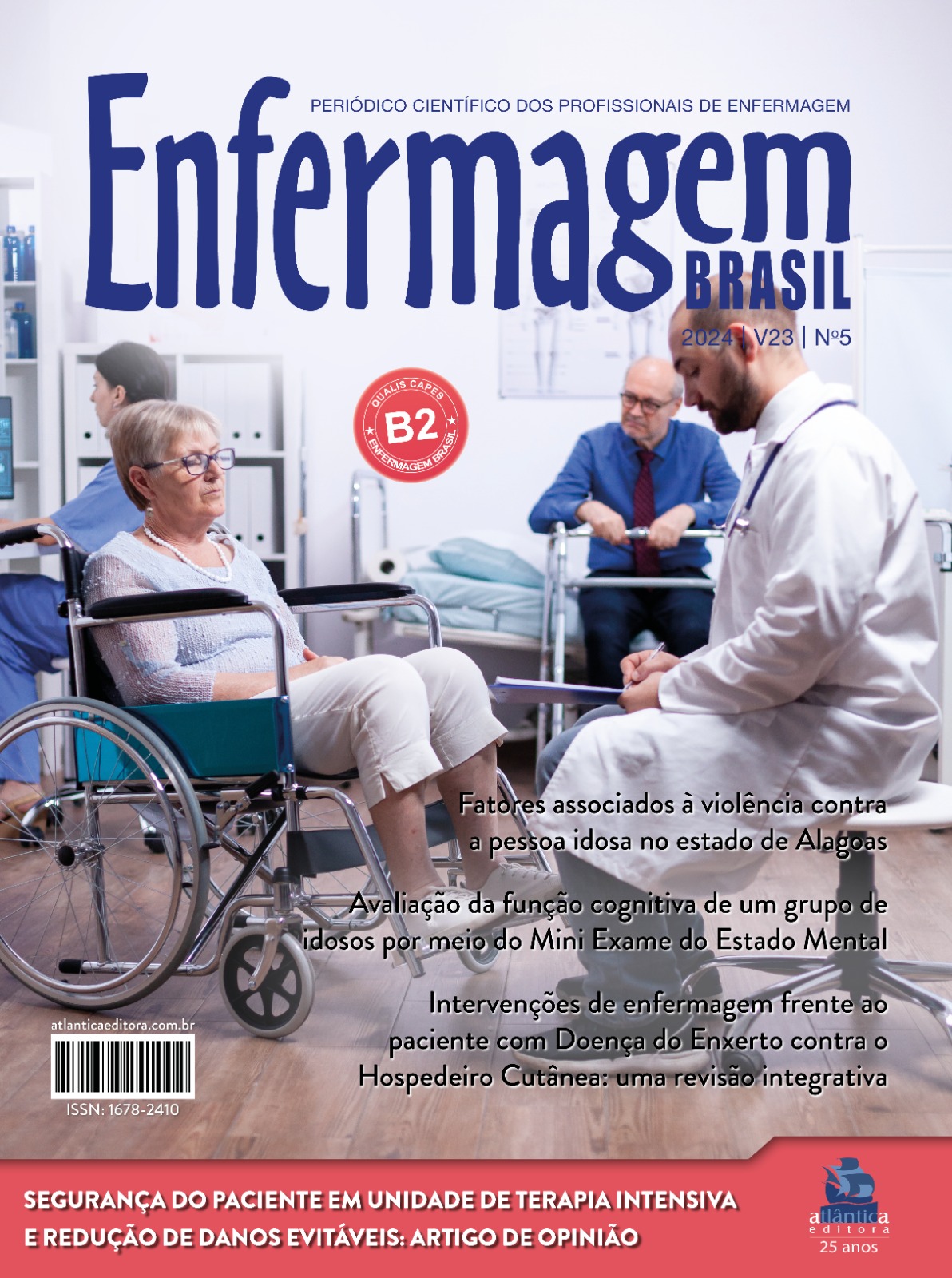Assessment of cognitive function in a group of elderly individuals using the Mini Mental State
DOI:
https://doi.org/10.62827/eb.v23i5.4031Keywords:
Mental status and dementia tests; nursing; aged.Abstract
Introduction: the increase in life expectancy has led to an increase in the number of elderly people in society. Along with aging, there is a decline in the aptitude of physical and cognitive capacities, which vary according to lifestyle. Nurses can assist in the tracking of the cognitive decline in the elderly through complementary tests, such as the Mini Mental State Examination (MMSE). Objective: to assess the cognitive function of a group of elderly people from the “Estação Conviver” project through the MMSE. Methods: a cross-sectional study, carried out in October 2024, in Campo Limpo Paulista. The sample was for convenience, evaluated through the MMSE, and the data were analyzed by descriptive statistics. Results: 30 elderly people participated, the majority of whom were female (25; 83%), with a sample composed of individuals between 60 and 80 years old, 25 (50%) with incomplete elementary education and 26 (87%) were pensioners. In this study, 20 (67%) elderly people presented some level of cognitive loss, with scores below the value established after adjusting for education. Conclusion: this study identified cognitive impairment in a group of elderly people. Identifying cognitive changes can be a predictor of degenerative diseases, but it can also help in measures that may reduce the rate of neurological deterioration.
References
Instituto Brasileiro de Geografia e Estatística. Projeção da população do Brasil e das Unidades da Federação. Brasília; 2017. Available from: https://www.ibge.gov.br/apps/populacao/projecao/
Schlindwein-Zanini R. Demência no Idoso: Aspectos Neuropsicológicos. Rev Neurocienc. 2010;28(4): 220-226. doi: https://doi.org/10.34024/rnc.2010.v18.8482
Mazo GZ, Capanema BDSV, Gil PR, Silva REL, Fank F, Franco PS. Comparação entre os domínios da função cognitiva e a capacidade funcional de centenários. Rev. Bras. Neurol. 2022;58 (1): 5 – 11.
Cova I, Markova A, Campini I, Grande G, Mariani C, Pomati S. Worldwide trends in the prevalence of dementia. J Neurol Sci. 2017;379:259-60. doi: https://doi.org/10.1016/j.jns.2017.06.030
Folstein M, Folstein S, McHugh P. “Mini-mental state”. A practical method for grading the cognitive state of patients for the clinician. J Psychiatr Res 1975;12(3):189-198. doi: https://doi.org/10.1016/0022-3956(75)90026-6
Melo DM, Barbosa AJG. O uso do Mini-Exame do Estado Mental em pesquisas com idosos no Brasil: uma revisão sistemática. Ciênc saúde coletiva. 2015;20(12):3865–76. doi: https://doi.org/10.1590/1413-812320152012.06032015
Brucki SMD, Nitrini R, Caramelli P, Bertolucci PHF, Okamoto IH. Sugestões para o uso do mini-exame do estado mental no Brasil. Arq Neuro-Psiquiatr. 2003Sep;61(3B):777–81. doi: https://doi.org/10.1590/S0004-282X2003000500014
Machado JF, Argimon IIL, Bós Ângelo JG. Fatores associados ao desempenho no Miniexame do estado mental de idosos jovens e longevos social e fisicamente ativos – um estudo comparativo. PAJAR. 2022;10(1):e42857. doi: https://doi.org/10.15448/2357-9641.2022.1.42857
Paiva KM, Faustino Gonçalves L, André PRPS, Samelli AG, Haas P. Perda auditiva e função cognitiva em idosos: uma revisão sistemática. Rev Neurocienc. 2023;31:1-20.. doi: https://doi.org/10.34024/rnc.2023.v31.14619
Santana TS, Santos IB, Oliveira KS, Cabral AOL, Farre SGMC. Mini Exame do Estado Mental e Desempenho Cognitivo entre idosos. Revista de trabalhos acadêmicos–Universo Belo Horizonte. 2022; 1(5). Available from:http://revista.universo.edu.br/index.php?journal=3universobelohorizonte3&page=article&op=view&path%5B%5D=8874
Wu Z, Phyo AZZ, Al-Harbi T, Woods RL, Ryan J. Distinct Cognitive Trajectories in Late Life and Associated Predictors and Outcomes: A Systematic Review. J Alzheimers Dis Rep. 2020;4(1):459–78. doi: https://doi.org/ doi.org/10.3233/ADR-200232
Nazar F, Gomes FRH, Oliveira V, Vagetti GC. Quality of life, physical activity and cognition in the elderly population: a systematic review. UNINGÁ Rev. 2020;35:eRUR2789. Available from: https://revista.uninga.br/uningareviews/article/view/2789
Petersen RC. Mild cognitive impairment. CONTINUUM: lifelong Learning in Neurology. 2016; 22(2):404-418. doi: https://doi.org/10.1212/CON.0000000000000313
Smid J, Studart-Neto A, César-Freitas KG, Dourado MCN, Kochhann R, Barbosa BJAP, et al. Declínio cognitivo subjetivo, comprometimento cognitivo leve e demência - diagnóstico sindrômico: recomendações do Departamento Científico de Neurologia Cognitiva e do Envelhecimento da Academia Brasileira de Neurologia. Dement neuropsychol. 2022;16(3):1–24. doi: https://doi.org/10.1590/1980-5764-DN-2022-S101PT
Livingston G, et al. Dementia prevention, intervention, and care: 2020 report of the Lancet Commission. Lancet. 2020;396(10248):413-46. doi: https://doi.org/10.1016/S0140-6736(20)30367-6
Downloads
Published
Issue
Section
License
Copyright (c) 2024 Maria José Soares da Silva, Sandy Cassemiro Cardoso, Suzeli Cristina da Silva Jacob, Adriana Nastaro Cinelli (Autor)

This work is licensed under a Creative Commons Attribution 4.0 International License.
Autores que publicam nesta revista concordam com os seguintes termos:
Autores mantém os direitos autorais e concedem à revista o direito de primeira publicação, com o trabalho simultaneamente licenciado sob a Licença Creative Commons Attribution 4.0 que permite o compartilhamento do trabalho com reconhecimento da autoria e publicação inicial nesta revista.
Autores têm autorização para distribuição não-exclusiva da versão do trabalho publicada nesta revista (ex.: publicar em repositório institucional ou como capítulo de livro), com reconhecimento de autoria e publicação inicial nesta revista.


